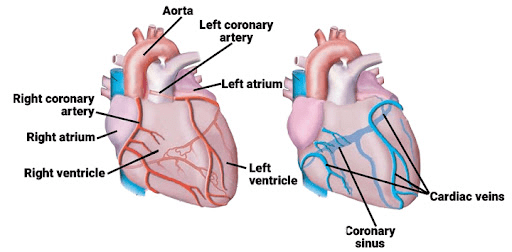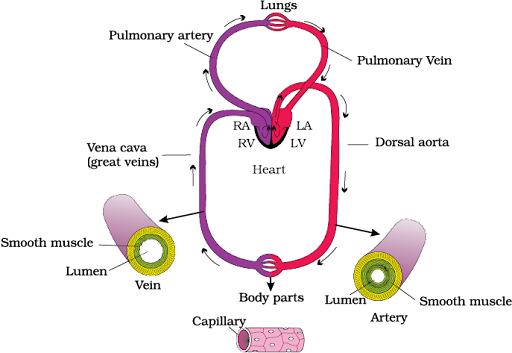




Body Fluids and Circulation
This article includes the important topics from the chapter Body Fluids and Circulation as per the Biology, NEET syllabus. This article will make all the topics of this chapter easy to understand for students getting ready for NEET as it contains the main and important topics for thorough preparation.
This article gives information on all of the important topics of the chapter and provides an insight into the exam pattern. By revising this document, students can recall all the answers to the important questions related to the chapter such as what is blood and plasma and what are their functions, what are formed elements and their significance in our body, what is blood group and how are they grouped, what is Rh grouping, what is blood coagulation, what is lymph, what are circulatory pathways, brief explanation about human circulatory system, what is cardiac cycle, what is electrocardiograph, what is double circulation, how do regulation of cardiac activity takes place, what are the disorders of circulatory system, etc.
Important Topics of Body Fluids and Circulation
Blood and plasma.
Formed elements.
Blood groups.
Coagulation of blood.
Lymph
Circulatory pathways.
Human circulatory system.
Cardiac cycle.
Electrocardiograph.
Double circulation.
Regulation of cardiac activity.
Disorders of circulatory system.
Important Concepts
Blood
Blood is a fluid that transports oxygen and nutrients to the cells and carries away carbon dioxide and other waste products. Blood can be classified both as fluid and tissue. Due to the presence of a collection of specialised cells performing specific functions, it is a tissue. These cells are suspended in plasma, which is a liquid matrix making the blood a fluid as well.
Constituents of the Blood
Plasma
The liquid portion of the blood is plasma, which contains more than 90% water. Water is essential to the existence of every living cell. Therefore, the water of the plasma is freely exchangeable with body cells and other extracellular fluids which maintains the normal hydration state of all the tissues.
Blood cells
Blood cells are specialised cells present in the blood that serve a particular function. There are various types of blood cells they are:
Red blood cells
White blood cells :
Granulocytes
Monocytes
Lymphocytes
Platelets
Formed Elements
The formed elements are cells and cell fragments suspended in the plasma. There are three classes of formed elements, they are
Erythrocytes
Leukocytes
Thrombocytes
Blood Groups
There are four main types of blood groups: A, B, AB and O. Each one is determined by the presence or absence of two antigens on the surface of red blood cells.
ABO Grouping
Rh Grouping
Rh in Rh blood group stands for Rhesus monkey. They are named so because they were first discovered in monkeys. The Rh system is a group of antigens that are present on the red blood cells. People who possess these Rh system factors are known as Rh blood group positive and those who do not have these factors are known as Rh blood group negative.
Coagulation of Blood
The process of blood coagulation leads to the formation of a blood clot. It is an important part of hemostasis, which refers to any process that stops bleeding by clot formation in injured vessels. This includes physiological processes in the body and also pathological processes resulting in uncontrolled bleeding.
Lymph
Lymph is formed when the fluid that lies in the interstices of all body tissues is gathered through lymph capillaries.
Circulatory Pathways
The two types of circulatory pathways are as follows:
Open circulatory system
Closed circulatory system
Human Circulatory System
The circulation of blood in the human body is essential to have enough oxygen to reach different cells. This particular oxygen is then used by our cells for other purposes, including respiration. Respiration is a critical process in our human body to carry out various life functions.

Cardiac Cycle
A cardiac cycle is a time period that starts from the contraction of the atria and ends at the relaxation of the ventricular. The terms important in this are given below.
Systolic, which is a contraction phase
Diastolic, which is relaxation phase
Electrocardiograph
It is a graphical representation of the electrical activity of the heart during a cardiac cycle. It helps to further detect the abnormalities and measure the functioning of the heart.
Double Circulation

Regulation of Cardiac Activity
The normal activity of the human heart is the cardiac cycle and is automatically regulated by nodal tissues - SA node and AV node.
Disorders of the Circulatory System
Given below is a list of some common disorders of the circulatory system.
High blood pressure
Coronary Artery Diseases
Angina
Heart failure
Solved Examples from the Chapter
1. What are plasma protein's significance?
Ans: Plasma proteins are proteins present in the blood plasma, so they are also called blood proteins. There are many plasma proteins that have various functions, and these plasma proteins are very important in the clinical diagnosis of any related disease to these blood proteins.
Some plasma proteins like albumin, which account for 55% of all plasma or blood proteins, play an important role. This protein contributes to maintaining the oncotic pressure of plasma and it also assists as a carrier in transport of lipids and steroid hormones.
Key points to remember: Plasma proteins- they are the blood proteins, that are the proteins present in blood plasma. These have many functions like transport of lipids, hormones and vitamins.
2. Blood is a connective tissue, why do we consider it so?
Ans: Blood is considered a connective tissue because it has a matrix, containing living cells like RBC, WBC, platelets. The fluid portion is called the plasma. It is a non-fibrous connective tissue.
Key point to remember: Blood- It is a type of connective tissue that measures around 5 litres in the adult human and reports 8 percent of the body weight.
Solved Problems of Previous Year Questions
1. The component of blood which prevents its coagulation in the blood vessels is
Haemoglobin
Plasma
Thrombin
Heparin
Ans: (d) Heparin
Heparin is considered as the natural anticoagulant of the body which prevents blood clotting in blood vessels by preventing the formation of thrombin.
Trick to remember: Heparin is an anticoagulant and heparin injection is given to avoid the harmful clots of the body. Sometimes it is also known as blood thinner even though it does not function in thinning of blood.
2. Thickening of arteries due to cholesterol deposition is:
Atherosclerosis
Rheumatic heart
Blood pressure
Cardiac arrest
Ans: (a) Atherosclerosis
Atherosclerosis is the buildup of plaque due to substances like cholesterol and other fat matter in the artery wall. Sclerosis means the abnormal hardening of the artery wall which blocks the blood flow since the arteries become narrow.
Trick to remember: Atherosclerosis is the condition in which the artery walls are built up with the fats and block the arteries. This leads to heart attack
3. What is diapedesis?
A kind of amoeboid movement.
The process of filtration of urea in the kidney.
A type of locomotion found in hydra.
Migration of WBCs into the tissue spaces from blood capillaries.
Ans: (d) Migration of WBCs into the tissue spaces from blood capillaries.
Diapedesis is the passage of blood cells through the intact walls of capillaries. Blood cells are the cells of the blood, which include Red Blood Cells, White Blood Cells and platelets. RBCs contain haemoglobin that helps in transport of oxygen to the body cells. WBCs provide immunity to the body. Platelets help in the clotting of the blood.
Trick to remember: Diapedesis- “The passage of blood cells through the intact walls of the capillaries, typically accompanying inflammation”.
Practice Questions
1. Maturation of erythrocytes require which one of the factors
vitamin - D
vitamin - A
vitamin - B12
vitamin - C
Ans: (c) vitamin - B12
Erythrocytes are also known as RBCs. They are the most important cell present in the blood that contains haemoglobin, which is responsible for the transport of oxygen and carbon dioxide in the body tissues. The RBCs mature with the help of vitamins, which is stored in the liver and is transported to the bone marrow. Maturation of erythrocytes requires vitamin - B12.
2. The thick muscular projections on the walls of the ventricle are called
Chordae tendineae
Columnae carneae
Conus arteriosus
Truncus arteriosus
Ans: (b) Columnae carneae
The columnae carneae muscular ridges project from the ventricles of heart inner walls.
Conclusion
This article can be of great help for students preparing for the NEET exam. NEET candidates can also revise the chapter effectively with this article as it contains all important information as per the NEET syllabus requirements. It includes all important concepts, topics, questions from previous year NEET question papers, NEET mock test and Biology NCERT books. Do try to answer the practice questions on your own to test your level of knowledge and preparedness.
NEET Important Chapter - Body Fluids and Circulation

 Share
ShareFAQs on NEET Important Chapter - Body Fluids and Circulation
1. Is Body Fluids and Circulation important for NEET?
Yes, Body Fluids and Circulation is an important chapter for the exam. It covers all necessary topics and concepts on body fluids and circulation along with solved questions that are vital for the NEET exam.
2. How many questions come in NEET from body fluids and circulation?
According to the previous year question papers analysis 20% of the questions are asked from the human physiology unit and around 2-3 questions can be expected from the body fluids and circulation chapter.
3. Which chapters in biology have more weightage in NEET?
In biology Diversity from Living Organisms, Human Physiology and Genetics and Evolution have a better chapter wise weightage of NEET 2022.




















 Watch Video
Watch Video


